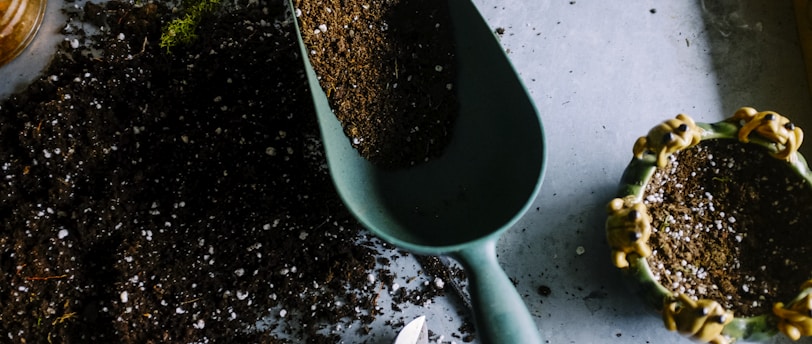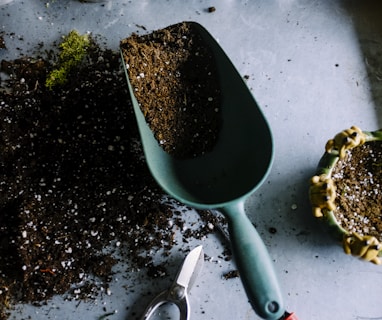The Benefits of Organic Gardening
Discover the advantages of organic gardening. From healthier plants to environmental sustainability, learn why more and more gardeners are embracing organic practices and how you can start your own organic garden.
7/5/20235 min read


In recent years, there has been a growing interest in organic gardening, as people become more conscious of their health and the environment. Organic gardening involves cultivating plants without the use of synthetic fertilizers, pesticides, or genetically modified organisms. Instead, it emphasizes natural methods that promote soil fertility and biodiversity. In this article, we will explore the numerous benefits of organic gardening and provide practical tips on how you can start your own organic garden at home.
One of the primary reasons people choose organic gardening is the health benefits it offers. By avoiding chemical pesticides and fertilizers, organic gardeners minimize exposure to harmful toxins. This can lead to improved overall health and a reduced risk of developing diseases associated with chemical exposure. Additionally, organic fruits and vegetables tend to have higher nutrient content, making them more nutritious for consumption. By growing your own organic produce, you have direct control over what goes into your food, ensuring its quality and safety.
Organic gardening is environmentally friendly and promotes sustainability. Synthetic pesticides and fertilizers used in conventional gardening can contaminate water sources and harm beneficial organisms in the soil. Organic gardening, on the other hand, promotes the use of natural pest control methods, such as companion planting and beneficial insects, which maintains a balanced ecosystem. Furthermore, organic gardening practices focus on improving soil health through techniques like composting and crop rotation, leading to healthier soil structure and increased water retention. By reducing chemical usage and promoting biodiversity, organic gardening helps protect the environment and contributes to a more sustainable future.
Starting an organic garden at home can lead to significant cost savings. Instead of purchasing expensive organic produce from grocery stores, you can grow your own at a fraction of the cost. Additionally, organic gardening encourages the use of compost and natural fertilizers, which are often cheaper and readily available compared to synthetic alternatives. By reusing kitchen scraps and yard waste, you can create nutrient-rich compost to enhance soil fertility, further reducing the need for costly inputs.
Engaging in organic gardening can have a positive impact on emotional and mental well-being. Spending time in nature and working with plants has been proven to reduce stress levels, boost mood, and improve mental clarity. Gardening also provides a sense of accomplishment and satisfaction as you witness the growth and development of your plants. The process of nurturing plants and observing their progress can be therapeutic and provide a sense of purpose. Furthermore, organic gardening offers an opportunity to connect with the natural world, fostering a deeper appreciation for the environment and the interconnectedness of all living things.
Getting Started
Now that we've explored the benefits of organic gardening, let's dive deeper into how you can start your own organic garden at home. Following these steps will set you on the path to a thriving organic garden.
a. Select a suitable location: Choose an area in your yard that receives ample sunlight and has good drainage. Most vegetables and herbs require at least six hours of direct sunlight each day. Avoid areas that are shaded by trees or buildings. Additionally, ensure the soil has good drainage to prevent waterlogging, which can harm plant roots.
b. Prepare the soil: Testing the soil pH is crucial to determine its acidity or alkalinity. You can purchase a soil testing kit from a garden center or send a sample to a local agricultural extension office for analysis. Most vegetables prefer a slightly acidic soil with a pH between 6.0 and 7.0. If your soil pH is outside this range, you can adjust it by adding organic matter. Incorporate compost, well-rotted manure, or peat moss into the soil to improve its structure and fertility. Organic matter enhances nutrient availability and moisture retention, creating a favorable environment for plant growth.
c. Plan your garden: Before planting, consider what plants you want to grow and their specific needs. Take into account factors such as spacing requirements, water needs, and sunlight preferences. Some plants, like tomatoes and peppers, require more space and support structures, while others, like leafy greens, can be grown closer together. By planning your garden layout, you can optimize space and ensure proper air circulation between plants, reducing the risk of disease. Consider using raised beds or containers if you have limited space or poor soil conditions.
d. Choose organic seeds or seedlings: When starting your garden, it's important to select organic seeds or seedlings to maintain the integrity of your organic practices. Look for certified organic seeds or seedlings from reputable sources. These have been produced without the use of synthetic pesticides or genetically modified organisms. Organic seeds are often labeled as such, and many seed catalogs and online retailers provide organic options. Alternatively, consider saving seeds from your own organically grown produce for future use.
e. Practice companion planting: Companion planting is an effective organic gardening technique that involves growing certain plants together to benefit each other. Some plant combinations naturally repel pests or attract beneficial insects, while others enhance flavor or growth. For example, planting marigolds near tomatoes can deter harmful nematodes and whiteflies, while basil planted alongside tomatoes can improve the flavor of the fruit. Research companion planting charts and experiment with different combinations to find what works best for your garden.
f. Implement organic pest control: Organic gardening encourages natural pest control methods that minimize harm to beneficial insects and the environment. Start by regularly inspecting your plants for signs of pests or disease. If you spot any, remove them by hand or use a strong jet of water to dislodge them. Encourage beneficial insects, such as ladybugs and lacewings, by planting flowers like daisies and yarrow. You can also make organic sprays using ingredients like neem oil, garlic, or soap to deter pests. Remember to apply these sprays sparingly and follow the instructions to avoid harming beneficial insects.
g. Water wisely: Watering is a critical aspect of gardening, and it's important to do it correctly to ensure healthy plant growth. Water deeply and thoroughly, allowing the soil to dry out slightly between waterings to promote strong root development. Watering in the morning or early evening reduces water loss through evaporation. Consider using mulch, such as straw or shredded leaves, around your plants to help retain soil moisture, suppress weed growth, and regulate soil temperature.
h. Maintain the garden: Regular maintenance is essential for a successful organic garden. Weed regularly to prevent competition for nutrients and water. Organic mulch can help suppress weed growth, making it easier to manage. Monitor your plants for any signs of disease or pest infestation, and take appropriate action promptly. Prune plants to improve airflow and remove dead or diseased parts. As plants grow, provide support structures like trellises or cages for vining crops such as cucumbers or beans.
i. Harvest and enjoy: Once your plants have matured, it's time to reap the rewards of your organic garden. Harvest your produce when it is ripe, following specific guidelines for each crop. This ensures maximum flavor and nutritional value. Organic fruits and vegetables are bursting with flavor and offer a diverse range of taste experiences. Share the bounty with friends and family, and savor the satisfaction of knowing you have grown your own healthy and delicious food.
Starting your own organic garden at home is an enriching experience that brings numerous benefits. By selecting a suitable location, preparing the soil, planning your garden, choosing organic seeds, practicing companion planting, implementing organic pest control, watering wisely, maintaining the garden, and harvesting with care, you can create a flourishing organic garden. Enjoy the beauty and rewards of nature as you grow your own fresh, nutritious produce while contributing to a sustainable and healthier lifestyle. With a little time, effort, and a deep appreciation for the natural world, you can embark on a fulfilling journey of organic gardening at home.
Organic gardening provides numerous benefits, ranging from improved health and environmental conservation to cost savings and enhanced well-being. By following the steps outlined in this article, you can start your own organic garden at home and experience the joys of growing your own organic produce. Embrace the natural methods of cultivation, and enjoy the taste and satisfaction of eating fresh, healthy food while contributing positively to the planet. Organic gardening is not only a rewarding hobby but also a step towards a more sustainable and healthier future.
